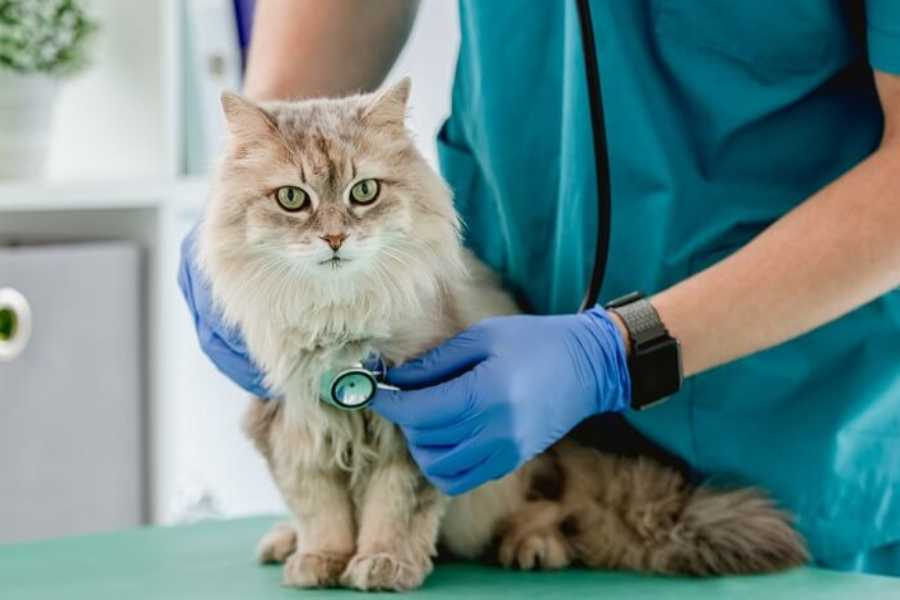How to Check if Your Cat Has a Fever?

Does your cat have a fever? There’s an easy way to tell. ![]()
As a pet owner, it’s crucial to be aware of your cat’s health and well-being. One common health issue that cats may face is a fever, also known in veterinary terms as pyrexia.
A fever is defined as a higher than normal body temperature. In this article, we’ll guide you on how to check if your cat has a fever, the signs and symptoms to watch for, and what to do if your cat does have a fever.
Understanding Normal Cat Temperature 🌡️

A normal cat’s temperature is 100.5 degrees Fahrenheit (38.0 degrees Celsius) plus or minus a degree.
So, if your cat’s temperature is 102 degrees Fahrenheit (39 degrees Celsius) and up, it means that your cat has a fever.
It’s important to note that these temperatures are averages and can vary slightly from cat to cat.
How to Take Your Cat’s Temperature 🌡️

The most accurate way to measure your cat’s temperature is with the use of an inexpensive rectal digital thermometer. While there are other methods, such as tympanic (ear drum) measurements, they are not as accurate.
To take your cat’s temperature, you’ll need a digital thermometer and some lubrication (like Vaseline or KY jelly). Lubricate the tip of the thermometer, lift your cat’s tail, and gently insert the thermometer just inside the rectum. Wait for the thermometer to beep, which usually takes about 30 to 60 seconds.
Remember: Always handle your cat gently and calmly during this process. If your cat becomes overly distressed, it may be best to seek help from a professional. ![]()
Signs and Symptoms of Fever in Cats 🐾

If your cat has a fever, they may exhibit certain signs and symptoms. The most common sign is a change in behavior. Your cat may seem off, withdrawn, or less active than usual. They may sleep more and show less interest in food.
Other signs include warm and hot ear tips. This can be a simple way to start checking if your cat has a fever. You can also check the groin area, which may also feel warm.
What to Do if Your Cat Has a Fever 🚑

If you suspect your cat has a fever, it’s important to try and determine the cause. Fever is typically caused by a bacterial or viral infection. In many cases, the fever may be due to a puncture wound or bite wound.
The first step is to ensure your cat stays hydrated. This may involve giving them an electrolyte solution like Pedialyte orally or even administering subcutaneous fluids. If your cat’s condition doesn’t improve or worsens, it’s crucial to take them to a veterinarian. They can determine the underlying cause and provide appropriate treatment, which may include IV fluids or antibiotics.
It’s also important to regularly examine your cat at home so you have a good sense of what their normal temperature is. This will help you identify when something is off.
When Does a Fever Pose a Risk? 🌡️

A fever becomes a concern when it reaches 103.5 degrees Fahrenheit or higher. At this point, the fever is considered high and can pose risks to your cat’s health. High fevers can cause dehydration, poor appetite, lethargic behavior, and even brain damage if they get too high. ![]()
Remember: If your cat’s fever reaches this high, it’s crucial to seek veterinary care immediately.
What Causes Fevers in Cats? 🐾

Most diseases are capable of causing fevers in cats. Certain diseases are known for certain temperatures that they cause the body to rise from. However, sometimes, despite various tests, the cause of the fever remains unknown. This is often categorized as “Fever of Unknown Origin” (FUO). This is more common in cats than dogs.
FUO can be particularly concerning as it often results in high fevers that can be damaging to the brain and cause seizures. In such cases, it’s crucial to control the fever and seek veterinary care.
Remember, your cat’s health is paramount. If you’re ever in doubt, it’s always best to consult with a professional. For more information on cat health, check out our other articles on why my cat has watery eyes and what shots are needed for cats. ![]()
Tags
Share
Table Of Contents
Related Posts
Quick Links

